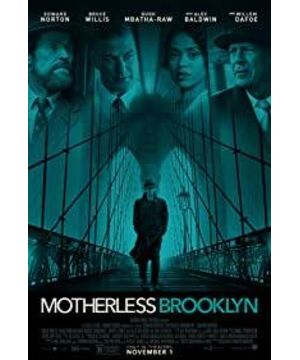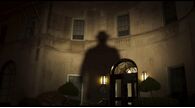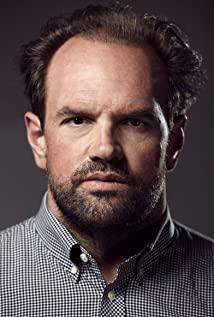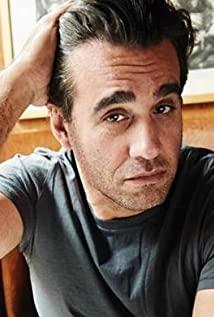“It’s good to have the power of a giant, but it is excellent to have a giant’s strength; but it is tyrannous to use it like a giant. Give it back
As early as 2000, Edward Norton deliberately put on the screen the detective novel "The Brooklyn Secret" published by Jonathan Lesser in 1999. Nineteen years full of twists and turns, experienced creative bottlenecks, bumped into walls, and even set fires, this Norton devotes all enthusiasm, self-directed and self-acted ambitions to finally meet the long-awaited audience.
"The Brooklyn Secret", which opened with the sound of Shakespeare's "A Tent for a Trap", tells the story of a "David and the Giant Goliath" style of street figures confronting a powerful giant. This little person is called Lionel, a Brooklyn orphan with Tourette's disease, who twitches uncontrollably, shouts words of inexplicable meaning, shrugs his shoulders, and shakes his head. This unnamed disease at the time made Lionel nicknamed a "deformed show" by his friends, but it also gave him a memory and insight that was different from ordinary people. His ability was valued by private detective Frank Minna. After Minna took the four boys including Lionel out of the orphanage and trained them as assistants, Minna became Lionel's mentor, father, and reason for survival.
Therefore, when Minna was killed in a meeting with her client, the only meaning of Lionel's life was to trace the truth. He put on the unfit coat left by Minna and dived into the misty night of New York, and after he writhed like a sweater, he found himself caught in a whirlpool of conspiracy.
In Leser's novel, the stage of Lionel's activities is New York in the 1990s, and the innovation of the element of the "modern black detective" is also one of the original selling points. However, when writing the script, Norton decided to move the story to the 1950s, and put this black detective story back into the time and space where it should have existed, and put it back into a small box like a car, steam and jazz filled the streets. , New York where men wear trilby hats and women wear headscarves.
The bold adaptation of the time setting may be due to Norton’s preference for the 1950s, or the desire to unfold the story of black detectives in a more reasonable environment from a textual perspective, or it may be due to the grandeur of New York’s urban history and conspiracy theories. Issues create more suitable soil. But judging from the final film, this decision may not be considered wise. The time change prevented Norton from digging into the original post-modern temperament in the film, and Norton’s restoration of New York in the 1950s did not achieve the best results.
The chronological scenes in "The Brooklyn Secret Case" are stereotyped with a bit of vacancy. Because the characters are captured more close-ups, the environment in which the characters are located does not have more room to show. This kind of treatment caused the exterior scene to appear cramped. Except for the same stepped porch and the Brooklyn Bridge, which is always foggy outside the window, no other New York city details can be seen.
The indoor scene lacks richness and details, like a model house built up of cardboard, with inconvincing wallpapers hastily pasted. In a scene at Central Station, although the details of light, shadow and dust are moving, and the dispatch of passersby is also poetic of a stage play, the whole picture still lacks a sense of age. Lionel's office and apartment are more like extremely simplified scenes that are out of time and lack real traces of life.
Another problem with the setting in the 1950s was that the film noir under this setting was too much, and this change by Norton directly compromised the original concept of the original. An unknown street detective, a beautiful woman in trouble, a bizarre conspiracy, these elements have been repeatedly drained by similar previous works, and adding a Tourette syndrome to the protagonist did not add much freshness.
What's even more regrettable is that in the hands of Norton, who directed the film for the second time in 20 years, this not-surprising detective story could not be told smoothly and perfectly. Perhaps the reason for the lack of director experience is that "The Brooklyn Secret" has more obvious rhythm problems. The beginning of the film directly enters the very compact Minna killing plot, throwing the audience into a fast-paced climax instantly, presumably audiences who have not watched the synopsis or trailer may be confused. Although in Norton's narration, Lionel and Minna's past was gradually revealed, but this efficient and fast plot still depleted the relationship and emotional establishment between the two characters to a certain extent.
However, when Lionel started investigating, the rhythm slowed down untimely in many places. Lots of monologues and dialogues, as well as a long performance in the jazz bar, suddenly broke the original splendid detective story line in a suspenseful place. "The Brooklyn Secret" is 2 hours and 24 minutes long, and there are many such lengthy and protracted passages that affect the overall smoothness.
In addition to the tempo which is sometimes too fast and sometimes too slow, the narrative of "The Brooklyn Secret" is a bit too big and full. Norton is very ambitious. He put a lot of issues into the film: the power game behind New York's urban planning, the clean-up of impoverished communities, the human rights social movement, and the racial issues linked to the times. He also squeezed in a lot of characters, little detectives and his brothers, social activists and his colleagues, politicians and his brothers, jazz bar owners and saxophone players, and tried to give each character enough screen. time. However, the original "Brooklyn Secret" has 300 pages. Norton added so many private goods while following the original story line, which eventually led to the slightly chaotic rhythm of the "Brooklyn Secret" film and the amount of information.
The third problem in the story is that the film noir created by Norton may be a bit too "bright" . This kind of brightness not only lies in the fact that the too bright lighting makes "The Brooklyn Secret" not meet the expectations of the general noir film, but also makes the whole somewhat optimistic story lacking a deeper response. This is not "forget it Jake, it's Chinatown", "The Brooklyn Secret" cannot bear to let its protagonist really step into the territory of tragedy and darkness from beginning to end. Everything in Lionel's investigation process was easy. He could listen to the necessary information in the shadows on the street corner, and he was caught by the villain without worrying about his life, and he could even get the opportunity to bargain and get out of his body illogically.
Some North American film critics joked that "The Brooklyn Secret" is a bright version of the origin story of "Joker". There are also two people who are mentally ill and cannot control themselves. They are disliked and hated by people around them. Arthur chooses violence and Lionel is endowed with superior memory. This super power finally confronts the big villain in a comic-style way of breaking through. Thinking of Alec Baldwin, the villain in this film, resigns from Thomas Wayne in "Joker", this analogy is even more interesting.
However, although "The Brooklyn Secret Case" shows Norton's jerkyness as a novice director, it carries a rare and precious enthusiasm. Although I don't fully agree with Norton's treatment of genre elements, I must admit that I was moved by the idealistic innocence and compassion that Norton still adheres to in film noir .
As a creator and interpreter, Norton has maintained a kind of respect for the sick protagonist Lionel from beginning to end. Lionel's illness may bring him ironic ridicule, or it may bring him trouble or even bad luck, but Norton tries his best to protect this character in every scene where Lionel becomes sick. He couldn't bear to let Lionel face any form of real malice, even if it was a comedy stage, Lionel was portrayed as more cute than ridiculous, not to compromise Lionel's dignity for sensational or lyrical purposes.
Norton is also quite talented in creating emotions. When Lionel walked through the steamy gray streets wearing the black coat left by Minna, his shoulders were swollen because of the wrong size, but he just bowed his head and walked forward; facing the broken-hearted Laura, Lionel patted her. , Twice, three times, there is warmth and sorrow in the uncontrollable obsessive-compulsive actions; and when Paul saw the big red Denied that shattered dreams, in front of Guan Zhang’s hat shop, he let the paper be blown by the wind. Up and walked to the street.
The theme song "Daily Battles" co-produced by Thom Yorke and Flea is a blurry dream, which adds too much to the lonely mood of "The Brooklyn Secret". And Daniel Pemberton, who has worked with Gerich on "Secret Agent" and "King Arthur", combined his unique rhythm with jazz, and brought a wonderful tension and playfulness to the process of spreading the suspense of "The Brooklyn Secret". .
In "The Brooklyn Secret Case," the topics Norton discussed were actually very bold and sharp. Using the role of the heroine Laura as a government worker and a social activist, Norton very carefully described the process by which power-holders clean up marginalized people and people of color, how the urban planning department deceived the residents of poor communities and caused them to be displaced, and the builders are also How to lower the height of the highway to Long Island to prevent poor people who take buses from entering. Although this ambition makes the movie a bit crowded, Norton is respectable for his firmness and uncompromising in expressing the message he wants to convey.
At the end of the film, Lionel and Laura sat quietly by the beach, and Laura said: " it's funny how things turn out ". Although Lionel's efforts did not change the final outcome of this power game, his just and necessary actions are already worthy of praise. Perhaps "The Brooklyn Secret" is the same for Norton himself. It is jerky and imperfect, and it is not a masterpiece that can be recorded in film history or change the territory of Hollywood, but this work spanning almost 20 years is private and passionate enough. "The Secret Case of Brooklyn" will not be the end of Edward Norton's road of editing and directing. Norton, who has finally completed this "lifetime" work, can have a good night's sleep.
View more about Motherless Brooklyn reviews











